|
|
|
Sort Order |
|
|
|
Items / Page
|
|
|
|
|
|
|
| Srl | Item |
| 1 |
ID:
143595
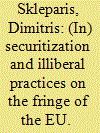

|
|
|
|
|
| Summary/Abstract |
Illiberal practices of liberal regimes have been extensively studied by critical security studies. The literature on risk emphasises the idea of imminent dangers and the logic of worst-case scenarios, which eventually unsettle the balance between security and liberty by always favouring the former in its most coercive and exceptional forms. This paper, by drawing on (in)securitization theory, attempts to explain how particular illiberal practices with respect to the control and management of immigration on the fringe of the EU become normalised. It argues that (in)securitization of immigration and illiberal practices are effects of the very functioning of a transnational field of (in)security professionals that are produced through the structural competition between different actors of this field over the definition of security and the appropriate control and management of immigration. In this respect, it uses Greece as a case study and draws on material gathered through interviews with Greek security professionals in Athens, Lesvos, Orestiada, and Alexandroupoli, and analysis of their discourse in dissertations they prepared during their study in police academies.
|
|
|
|
|
|
|
|
|
|
|
|
|
|
|
|
| 2 |
ID:
143594
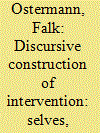

|
|
|
|
|
| Summary/Abstract |
This article analyses French executives' and lawmakers' legitimisations of the intervention in Libya with the aim of understanding the discursive construction of intervention. It investigates the arguments in favour of intervention and the oppositions they were confronted with. To these arguments belong a re-evaluated democratic legacy of France, an identification with the Libyan people, and a debate on Responsibility to Protect and the rule of law in world politics, which have a broader relevance for French actorness abroad. The article applies the Essex School discourse theory and techniques from Interpretive Policy Analysis on executive speeches and parliamentary documents for structuring the debate and for estimating the strength of ideas in their interdiscursive configuration. An ideal-typical explanation of the legitimisation of intervention and of the choice of one policy over another is made. The article argues that going to war in Libya equated to a question of cultural appropriateness.
|
|
|
|
|
|
|
|
|
|
|
|
|
|
|
|
| 3 |
ID:
143593
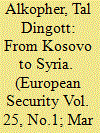

|
|
|
|
|
| Summary/Abstract |
The civil war in Syria began approximately four years ago and has resulted in the murder of thousands by the Assad regime and the flight of millions to neighbouring countries. The international community's reluctance to intervene to halt the ongoing massive human rights violations has been explained in geopolitical, military-strategic, diplomatic, and legal terms. Yet, what does this imply normatively? And does the weakening of the military humanitarian intervention (MHI) norm support arguments regarding the poverty of constructivist security studies? This article examines these two questions and demonstrates the weakness of the MHI norm, especially in light of the new interpretations and meanings which authoritative agents ascribe to its key conceptual components in changing strategic, social and political contexts. Yet, the article employs constructivist tools to explore the endogenous challenges to the MHI norm while proving the added value of constructivist security research, not only for explaining “norm evolution” but also “norm decline”. Taking discourse as a reflection of social norms and an arena for encouraging new intersubjective interpretations of concepts, it examines the above assertions by analysing the discourse of NATO Secretaries General from 1999 (Kosovo crisis) to today.
|
|
|
|
|
|
|
|
|
|
|
|
|
|
|
|
| 4 |
ID:
143592
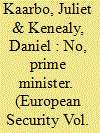

|
|
|
|
|
| Summary/Abstract |
On 29 August 2013, the UK House of Commons inflicted the first defeat on a Prime Minister over a matter of war and peace since 1782. Recalled to debate and vote on UK intervention in Syria, the Commons humbled the government and crucially impacted the development of UK foreign policy. This article places that vote, and the developments leading to it, in the context of the role of parliaments in security policy and explores the relationships between parliamentary influence, leadership, intra-party and intra-coalition politics, and public opinion. From an in-depth analysis of leaders’ statements and parliamentary debate, we find a combination of intra-party politics and party leadership were most significant. An additional factor – the role of historical precedent – was also important. Our analysis explores the fluidity and interconnectedness of the various factors for parliamentary influence in foreign policy and offers directions for future theoretical development and empirical research.
|
|
|
|
|
|
|
|
|
|
|
|
|
|
|
|
| 5 |
ID:
143596
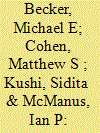

|
|
|
|
|
| Summary/Abstract |
Although many policy-makers and scholars maintain that international norms have altered the motivations underlying state behaviour, this article argues that states continue to pursue national self-interest, but in ways that remain understudied. While traditional realist assumptions explain a great deal of state behaviour, they have not been widely used to account for important alternative tools of state intervention, such as economic and normative strategies. Focusing on the case of Russia's 2014 intervention in Ukraine, this article offers insights into how, and under what circumstances, these tools are used to accomplish traditional state objectives. Guided by the tenets of neoclassical realism, the article argues that in the case of Russia, military force is no longer the sole, or even the primary, means used to accomplish traditional security goals. Such dynamics have significant theoretical and policy implications for contemporary international relations.
|
|
|
|
|
|
|
|
|
|
|
|
|
|
|
|
| 6 |
ID:
143597
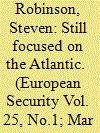

|
|
|
|
|
| Summary/Abstract |
This article examines the limited Europeanization of contemporary Portuguese security policy and highlights how the persistence of North Atlantic Treaty Organisation (NATO) and the emergence of the Lusophone world have shaped Portuguese participation in the European Union's (EU's) Common Foreign and Security Policy in recent years, particularly in Common Security and Defence Policy (CSDP) missions in Africa and in the European Defence Agency's co-operation activities. Europeanization's conceptual weaknesses, combined with the mutually reinforcing nature of transatlantic, EU and Lusophone security co-operation, have reinforced the ambiguous nature of what a “Europeanized” vision for European security might look like, especially given long-standing loyalties to NATO. This affords states considerable margin for manoeuvrability in defining their security priorities, so long as they are seen as being broadly consistent. This article reassesses the appropriateness of the Europeanization concept and shows how Portugal has approached this strategic balancing act, supporting the development of the EU's CSDP whilst remaining loyal to NATO and seeking to develop security relations in the Lusophone world, achieving legitimacy by stressing complementarity and multilateralization in security co-operation.
|
|
|
|
|
|
|
|
|
|
|
|
|
|
|
|
| 7 |
ID:
143591
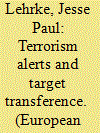

|
|
|
|
|
| Summary/Abstract |
This article examines how terrorist alerts and terrorist threats interacted during a period of heightened alert in Europe in late 2010. Taking from game theory the concepts of target transference (by terrorists) and defence races (among states) and using their underlying rationalist logic as a causal mechanism, the article attempts to construct an analytical narrative of the till now unwritten history of this event. In the process, the event serves to test whether the observable implications of theory corresponded to reality in this case. The study finds that during the Euro-alert transference in time was more common than transference of place and that there was more resistance to defence races than theory predicts. The alert itself was only a qualified success; the extent to which it was effective was determined by its combination with other offensive actions. The findings call for more attention to be given to terrorist preferences, inter-temporal transference and its relationship to bandwagoning, and state resistance to defence races with consideration of the role of information.
|
|
|
|
|
|
|
|
|
|
|
|
|
|
|
|
|
|
|
|
|